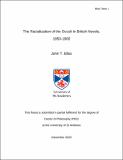Files in this item
The racialization of the occult in British novels, 1850-1900
Item metadata
| dc.contributor.advisor | Gill, Clare | |
| dc.contributor.author | Bliss, John T. | |
| dc.coverage.spatial | 277 p. | en_US |
| dc.date.accessioned | 2021-07-27T11:19:51Z | |
| dc.date.available | 2021-07-27T11:19:51Z | |
| dc.date.issued | 2021-12-01 | |
| dc.identifier.uri | https://hdl.handle.net/10023/23649 | |
| dc.description.abstract | This thesis examines the ways in which the occult and its practitioners are represented in British novels from 1850-1900 and asserts that their representations are racialized in each case. Specifically, this thesis analyzes how the practice of the occult is portrayed in Cranford by Elizabeth Gaskell (1854), A Strange Story by Edward Bulwer-Lytton (1861), The Moonstone by Wilkie Collins (1868), Strange Case of Dr. Jekyll and Mr. Hyde by Robert Louis Stevenson (1886), Trilby by George Du Maurier (1894), The Blood of the Vampire by Florence Marryat (1897), The Beetle by Richard Marsh (1897), and Cleo the Magnificent by Louis Zangwill (1899). I argue that these novels are emblematic of the ways that British novels participated in, contributed to, and commented on the racialization of the occult that occurred across different genres of fiction published in the second half of the nineteenth century, emphasizing that while individual characters are shaped more specifically by the prevailing discussions of race and the occult that existed during the time of their publication. To demonstrate how pervasive this trend was, this thesis deliberately incorporates a range of canonical and non-canonical texts across several genres that participate in the racialization of the occult, organized by the type of occult practice being racialized. This racialization is accomplished through an emphasis on five key elements regarding occult characters in the novel: physical darkness, a comparison to dangerous animals, a threat posed to the white characters, the framing of the occult character as representative of their entire race, and the eventual removal of the occult character from the story. The novels I examine here contain these elements with minor variations. They are also present in representations of different races, classes, and genders, reinforcing the association of “the Occult” with “the Other.” | en_US |
| dc.language.iso | en | en_US |
| dc.publisher | University of St Andrews | |
| dc.rights | Creative Commons Attribution-NoDerivatives 4.0 International | * |
| dc.rights.uri | http://creativecommons.org/licenses/by-nd/4.0/ | * |
| dc.subject | Occult | en_US |
| dc.subject | Literature | en_US |
| dc.subject | Racialization | en_US |
| dc.subject | British | en_US |
| dc.subject | Novel | en_US |
| dc.subject | Science | en_US |
| dc.subject | Race | en_US |
| dc.subject | Cranford | en_US |
| dc.subject | A strange story | en_US |
| dc.subject | The moonstone | en_US |
| dc.subject | Strange case of Dr Jekyll and Mr Hyde | en_US |
| dc.subject | Trilby | en_US |
| dc.subject | The blood of the vampire | en_US |
| dc.subject | The beetle | en_US |
| dc.subject | Cleo the Magnificent | en_US |
| dc.subject | Mesmerism | en_US |
| dc.subject | Hypnotism | en_US |
| dc.subject | Gender | en_US |
| dc.subject | Class | en_US |
| dc.subject | Alchemy | en_US |
| dc.subject | Conjuring | en_US |
| dc.subject | Stage magic | en_US |
| dc.subject | Theosophy | en_US |
| dc.subject | Imperialism | en_US |
| dc.subject | Other | en_US |
| dc.subject | Elizabeth Gaskell | en_US |
| dc.subject | Edward Bulwer-Lytton | en_US |
| dc.subject | Wilkie Collins | en_US |
| dc.subject | Robert Louis Stevenson | en_US |
| dc.subject | George Du Maurier | en_US |
| dc.subject | Florence Marryat | en_US |
| dc.subject | Richard March | en_US |
| dc.subject | Louis Zangwill | en_US |
| dc.subject | Victorian | en_US |
| dc.subject | Empire | en_US |
| dc.subject | Anxiety | en_US |
| dc.subject | Magic | en_US |
| dc.title | The racialization of the occult in British novels, 1850-1900 | en_US |
| dc.type | Thesis | en_US |
| dc.type.qualificationlevel | Doctoral | en_US |
| dc.type.qualificationname | PhD Doctor of Philosophy | en_US |
| dc.publisher.institution | The University of St Andrews | en_US |
| dc.identifier.doi | https://doi.org/10.17630/sta/116 |
The following licence files are associated with this item:
This item appears in the following Collection(s)
Except where otherwise noted within the work, this item's licence for re-use is described as Creative Commons Attribution-NoDerivatives 4.0 International
Items in the St Andrews Research Repository are protected by copyright, with all rights reserved, unless otherwise indicated.


